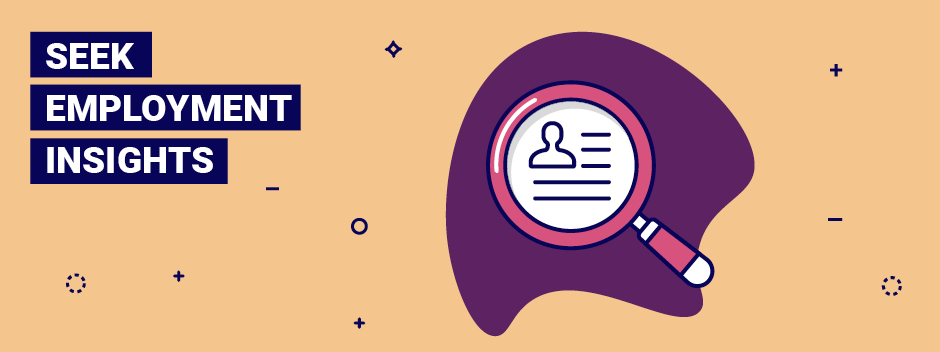Research conducted on behalf of SEEK reveals how the working lives of Australians have been impacted, what people are thinking and feeling about the job market now, and how their priorities have shifted.
Here’s a look at the key insights to help inform your recruitment strategy, plus how one major company is focused on ensuring its employees feel connected and valued now.
Australians are on the move
Almost 40% of Australians were considering moving to an industry that is less likely to be impacted by COVID-19, the July research reveals. The figure was slightly higher for those currently working in Hospitality & Tourism.
Geoff Slade, Executive Chairman of TRANSEARCH International Australia, says safety and security are among the top considerations for workers across all industries.
“I think there’s a general sense of nervousness across industries and it’s been hard to predict when the economy will recover,” he says.
With more people looking to enter new industries, Slade says employers should adjust their focus to ensure they can identify candidates’ transferable skills.
“In my experience, most companies like to employ people who have direct experience in their industry,” he says. “But, if people are more willing to move into different industries now, think about the skills you need and how they can be transferred into your industry. There might be a lot of good talent out there that you may have traditionally overlooked.”
Read more here about how you can identify transferable skills in candidates, including the questions to ask. These tips on screening candidates for transferable skills could also help you adjust your hiring strategy to access new talent pools.
According to the research, more than half (51%) of Australians were more hesitant to take on contract or casual work.
“The challenge for employers is that many are more likely to be looking for contractors right now,” says Slade. “I expect this trend to continue for some time due to a general feeling of uncertainty.
“But, if you are genuinely open to converting the role to full time down the track, let your candidates know this,” adds Slade. “It gives them the opportunity to show what they’re made of when they get the job and they may perform even better than your expectations.”
-Breaker%20Images3.jpg)
Victorians were facing more uncertainty in July than most other Australians. Almost half (47%) of them agreed that COVID-19 had made them rethink their career – and this may be good news for companies looking to attract top talent.
At companies like L’Oreal, which employees about 1000 people across the country, attraction and retention have remained a priority throughout the pandemic.
Irene Bau, Talent Acquisition Manager ANZ at L’Oreal, says the company has a focus on maintaining its current workforce and increasing employee engagement.
“We have facilitated 58 ‘staying connected’ sessions with the purpose of getting small groups across the business to chat about how they'd been impacted by lockdown,” she says. “Some of the sessions have been quite light-hearted and some a little bit more challenging, which is a reflection of the varied reality we’re facing right now.”
L'Oreal Australia CEO Rodrigo Pizarro has also presented virtual updates every fortnight to help all staff feel connected to the business during lockdown.
“It’s more than an update of business performance,” says Bau. “It includes information about changes the government has been making during the crisis and how the company is responding to them.”
Along with technical upskilling workshops, L’Oreal has also focused on soft skills training, such as emotional intelligence and leadership in virtual environments.
“I think every business has had to look at cost savings, but we have continued to prioritise training and developing new skills,” says Bau. “It’s really important to invest in people, especially at a time like this.”
When times are tough economically, training is often one of the first areas to be targeted for budget cuts. But there are ways you can still deliver training on a leaner budget: read here about how to maximise your budget.
In a year characterised by uncertainty, it may be no surprise that nearly two thirds (64%) of Australians say job security has become even more important to them.
Almost one in five are considering lower-skilled jobs and 30% say they would accept a lower salary to secure a job offer.
Slade says that while it’s difficult to guarantee job security in the current environment, employers should be more open with candidates about their company performance and why they are looking to recruit.
“During the recruitment process, companies have to build a story that is compelling,” he says. “There are ways of building a sense of security into that story. Talk about the company’s track record, its profit, how long the previous incumbent was in the job and the need for change.
“Generally speaking, employers tend to give a cursory explanation for a lot of this stuff, but it’s important to be as transparent as possible so people feel more confident.”
Bau says L’Oreal is focusing on making employees feel valued.
“We have a lot of advisers who work at beauty counters that were not operating during the lockdown,” she says. “So, we redesigned their roles to become digital beauty advisers and people can connect virtually for a consultation.
“I think through redesigning jobs, we’ve really shown the lengths that we’ll go to in order to keep our people and to make them feel secure.”
We’ll keep you informed of the key themes around how Australian workers are thinking and feeling in line with the changing job market.
Source: Independent research conducted by Nature on behalf of SEEK. Interviewing 4800 Australians annually. Published September 2020.

-Breaker%20Images2(1).jpg)
-Breaker%20Images.jpg)
